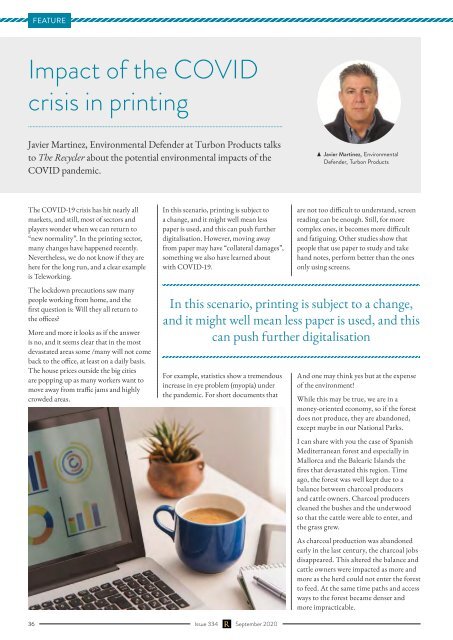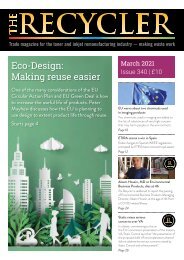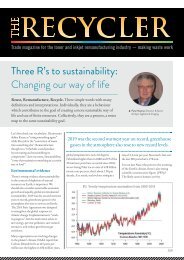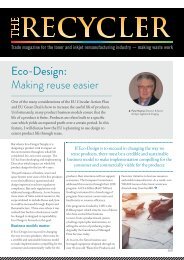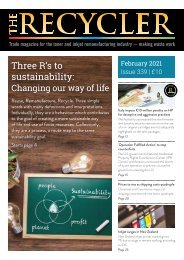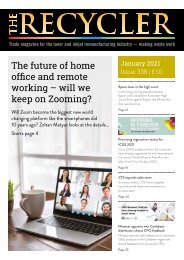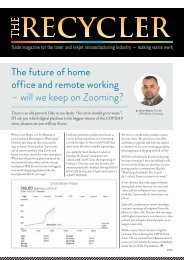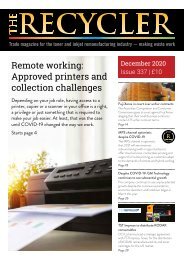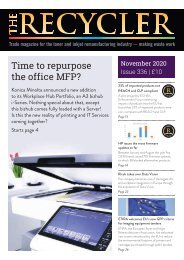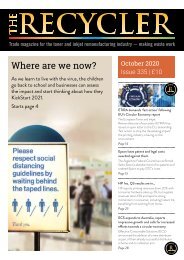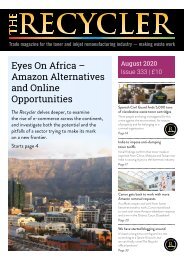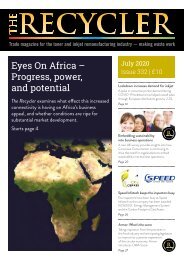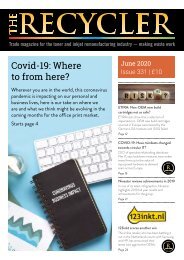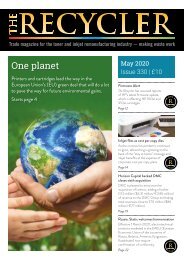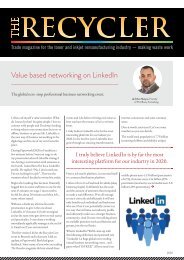The Recycler Issue 334
Create successful ePaper yourself
Turn your PDF publications into a flip-book with our unique Google optimized e-Paper software.
FEATURE<br />
Impact of the COVID<br />
crisis in printing<br />
Javier Martinez, Environmental Defender at Turbon Products talks<br />
to <strong>The</strong> <strong>Recycler</strong> about the potential environmental impacts of the<br />
COVID pandemic.<br />
▲ Javier Martinez, Environmental<br />
Defender, Turbon Products<br />
<strong>The</strong> COVID-19 crisis has hit nearly all<br />
markets, and still, most of sectors and<br />
players wonder when we can return to<br />
“new normality”. In the printing sector,<br />
many changes have happened recently.<br />
Nevertheless, we do not know if they are<br />
here for the long run, and a clear example<br />
is Teleworking.<br />
In this scenario, printing is subject to<br />
a change, and it might well mean less<br />
paper is used, and this can push further<br />
digitalisation. However, moving away<br />
from paper may have “collateral damages”,<br />
something we also have learned about<br />
with COVID-19.<br />
are not too difficult to understand, screen<br />
reading can be enough. Still, for more<br />
complex ones, it becomes more difficult<br />
and fatiguing. Other studies show that<br />
people that use paper to study and take<br />
hand notes, perform better than the ones<br />
only using screens.<br />
<strong>The</strong> lockdown precautions saw many<br />
people working from home, and the<br />
first question is: Will they all return to<br />
the offices?<br />
More and more it looks as if the answer<br />
is no, and it seems clear that in the most<br />
devastated areas some /many will not come<br />
back to the office, at least on a daily basis.<br />
<strong>The</strong> house prices outside the big cities<br />
are popping up as many workers want to<br />
move away from traffic jams and highly<br />
crowded areas.<br />
In this scenario, printing is subject to a change,<br />
and it might well mean less paper is used, and this<br />
can push further digitalisation<br />
For example, statistics show a tremendous<br />
increase in eye problem (myopia) under<br />
the pandemic. For short documents that<br />
And one may think yes but at the expense<br />
of the environment!<br />
While this may be true, we are in a<br />
money-oriented economy, so if the forest<br />
does not produce, they are abandoned,<br />
except maybe in our National Parks.<br />
I can share with you the case of Spanish<br />
Mediterranean forest and especially in<br />
Mallorca and the Balearic Islands the<br />
fires that devastated this region. Time<br />
ago, the forest was well kept due to a<br />
balance between charcoal producers<br />
and cattle owners. Charcoal producers<br />
cleaned the bushes and the underwood<br />
so that the cattle were able to enter, and<br />
the grass grew.<br />
As charcoal production was abandoned<br />
early in the last century, the charcoal jobs<br />
disappeared. This altered the balance and<br />
cattle owners were impacted as more and<br />
more as the herd could not enter the forest<br />
to feed. At the same time paths and access<br />
ways to the forest became denser and<br />
more impracticable.<br />
36 <strong>Issue</strong> <strong>334</strong> September 2020


